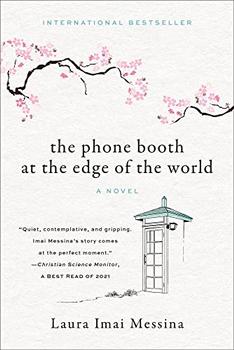Summary | Excerpt | Reading Guide | Reviews | Beyond the Book | Readalikes | Genres & Themes | Author Bio

Critics' Opinion:
Readers' Opinion:
First Published:
Mar 2021, 416 pages
Paperback:
Oct 2022, 416 pages
 Book Reviewed by:
Book Reviewed by:
BookBrowse First Impression Reviewers
Buy This Book
Chapter 3
As she played around with the satnav, Yui tried desperately not to be sick.
The view of the sea had that effect on her for the first few minutes every time she saw it. As though, just by looking at it, the water would rush into her mouth, choking her. So she would quickly stuff something else in her mouth, a square of chocolate or a sweet, and within moments she would be used to the sight and the spasms would ease.
In the month following the tsunami, she had lived on a six-and-a-half-by-ten-foot sheet of canvas in an elementary-school gymnasium with 120 other people. And yet she would never again feel as lonely as she had in that place.
Despite the heavy snowfall, almost unheard of in March, she would go outside as often as she could. She would squeeze through a crack in the wall of the school playground and cling to a tree that seemed firmly rooted to the earth. From there she would contemplate the ocean, now back in its correct position, and the crater of rubble it had left in its wake.
She scrutinized the water intensely; she hadn't looked at anything else for weeks. She was convinced that in there she would find the answer.
Every morning and every evening she would go to the information center with the same query. Two names and two descriptions: the pigtails, the mid-length gray hair, the color of a skirt, the mole on a stomach.
On her way back she would make hasty use of the school bathrooms, which were designed for children aged six to eleven. She would walk up and down the corridors wallpapered in drawings and homework assignments. Then she would return to her small square of life, silenced by all the absurdity.
Some people, among the canvas sheets laid out on the linoleum floor, wouldn't stop talking. They needed to say it out loud to be sure it had really happened. Others, however, said nothing, as if they were terrified to read the next page, where they knew the tragedy would take place. They convinced themselves that if that page wasn't turned, the inevitable wouldn't happen. Others still, the ones who already knew everything, had nothing left to say. The majority were waiting, and Yui was one of them.
Depending on what you were told at the information center, you belonged to one of two groups: those who knew and those who were waiting. Sometimes people would go on to another shelter, where they'd find the people they had been waiting for waiting for them.
There were hundreds of astonishing stories to tell. Everything, when you looked back on it, seemed like part of a plan ("If I hadn't been in bed sick ...", "If I'd turned right instead of left ...", "If I hadn't got out of the car ...", "If we hadn't gone home for lunch ...").
Everybody had heard the voice of the young woman working at the city hall, one hundred yards from the sea, who hadn't taken a moment's break from broadcasting the tsunami warning through the loudspeaker, the repeated command to run up hills, climb to the highest floors of reinforced concrete buildings. Everybody knew that even she hadn't been saved.
The images on mobile phones, which people were now lining up for hours to recharge, played back the absurd spectacle of men, women, and children clinging to rooftops, capsized cars, houses that—after putting up a good fight—followed their inhabitants into the water's deadly flow, whirling like the rinse cycle of a washing machine.
And then there was the fire, which nobody ever imagined could overcome the water. We were taught as children that scissors beats paper, paper beats rock, and water always beats fire, extinguishing it and saving our lives. Nobody could recall, from those childhood lessons, that time is everything, and smoke fills the lungs faster than anything else. That you can also die from flames in a tsunami, without the water ever touching you.
Excerpted from the new book The Phone Booth at the Edge of the World by Laura Imai Messina published by The Overlook Press © 2021





The Flower Sisters
by Michelle Collins Anderson
From the new Fannie Flagg of the Ozarks, a richly-woven story of family, forgiveness, and reinvention.

The House on Biscayne Bay
by Chanel Cleeton
As death stalks a gothic mansion in Miami, the lives of two women intertwine as the past and present collide.

The Funeral Cryer by Wenyan Lu
Debut novelist Wenyan Lu brings us this witty yet profound story about one woman's midlife reawakening in contemporary rural China.
Your guide toexceptional books
BookBrowse seeks out and recommends the best in contemporary fiction and nonfiction—books that not only engage and entertain but also deepen our understanding of ourselves and the world around us.